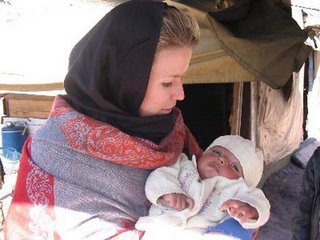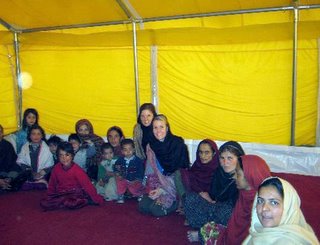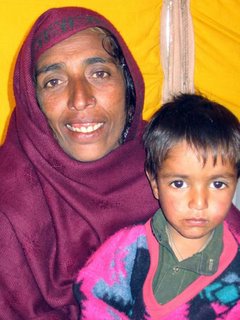Posted from Pakistan on Thursday, Jan. 26, 2006
By Katie Roland, Metro Marketing &
Communications Director for New York
One precious little child, orphaned by the earthquake, rested in my arms this morning. Ajmal was only three days old when he lost both parents to the October 8 quake. A smiley, playful little guy, he was more than happy to be the center of attention. Continued below.
Katie with baby Ajmal.

Katie and Amber meet with the women of the tent village in Balakot.

Gulzar, whose family died before her eyes, walked seven days to reach this tent village. Shown here with a surviving nephew.
Ajmal is one of many children left without parents after the earthquake. We met him on a home visit with Lumna, one of World Vision’s Child Protection Officers. Lumna’s role is to look after at-risk children in communities affected by the earthquake. She makes sure orphaned children like Ajmal are being cared for by extended family, and have necessary items like warm clothing and milk. She also checks on the health and hygiene of the children and helps them get medicine and hospital care when necessary.
The same day we met Ajmal, we also had the rare opportunity to speak with twelve women in a tent village in Balakot. In Pakistani culture, it can be difficult to speak with women, as they are often confined to their homes or are required to rely on their husbands to represent them publicly. This tradition creates a challenging situation for the women in relief situations, as they are often unable to leave their homes to get the aid they need.
In addition, it can be difficult for men to accurately communicate the children's needs, so aid workers might not always have the best idea of how to help. For a variety of cultural and work-related reasons, men tend to be less connected to their young ones. If you ask a typical male how his child is faring after the disaster, he will say tiki, which means "fine" in Pakistani. However, if you ask a woman, she will tell you that the child doesn’t have enough warm clothing, or that he or she is afraid to go to school, or that the family needs more privacy in order to maintain it's emotional health.
Women are essential in protecting children. And the women we spoke with this afternoon are protectors and survivors, in the most courageous, resourceful sense of these words. One woman, named Gulzar, walked seven days with no food to make it safely to the tent village where she and her orphaned nephew are now receiving aid. Her sister (the baby’s mother) and both her parents died in front of her eyes.
As brave as Gulzar has been, she melted into tears when we asked about her fears for the future. "I pray not to die before my children. And I don’t want to see them die in front of me. It’s too much. It’s been too much already," she said.
As I spoke with these women, I realized that we had different frameworks for the term "future." When I asked what hopes and dreams these women have, I was expecting to hear something about "providing an education for my children," or "owning my own land." But the response I heard was more immediate, more urgent: Warm clothing for my children. My own tent so I don’t have to share with 12 others. A sewing machine so I can make handicrafts and have a source of income.
As a New Yorker, it is difficult to imagine limiting my thoughts of the future to the next month or two. So many choices and opportunities abound! Yet for these 12 Pakistani women and their children, the next few months mean survival. Without a sense of security about the future, it is difficult to think beyond those basic elements of food, shelter, and warmth.

No comments:
Post a Comment